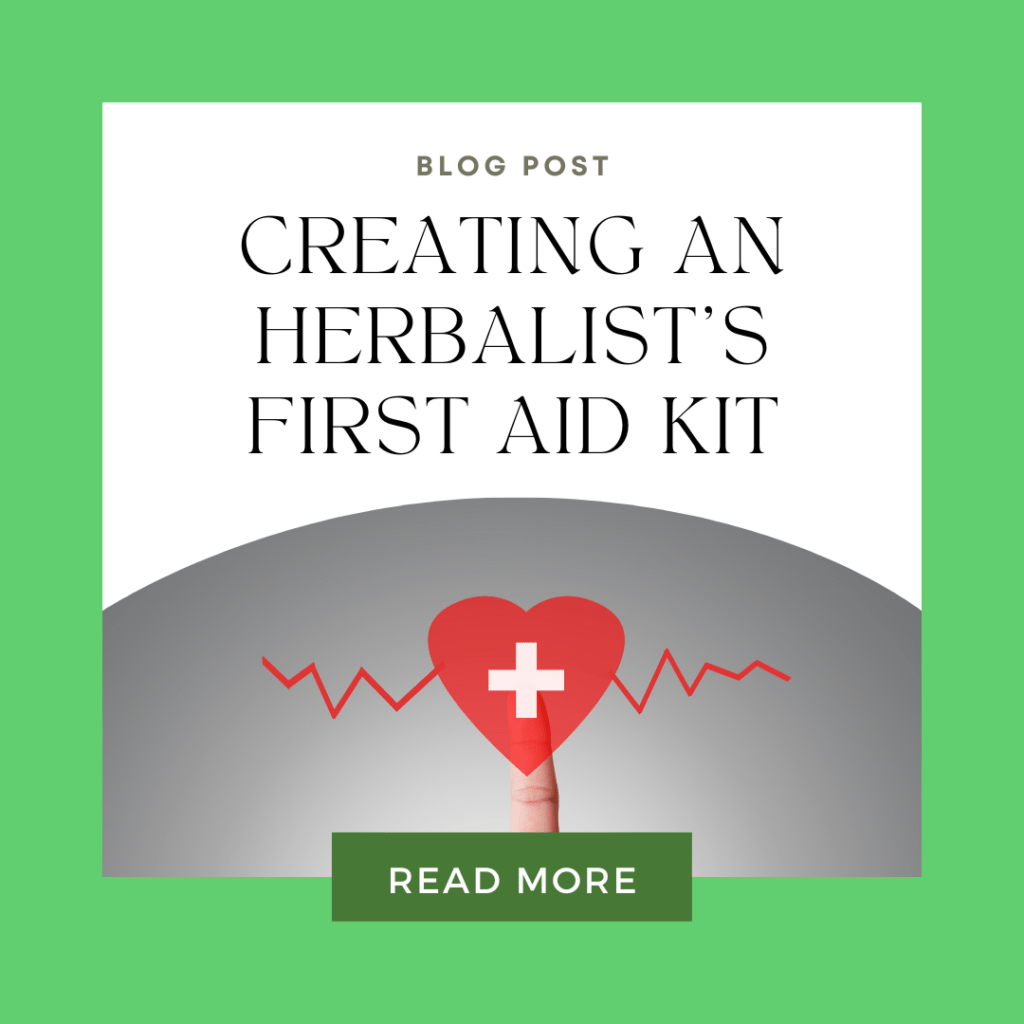For centuries herbal remedies have been relied upon to handle a number of health concerns. Herbalists, those who are skilled in the art and science of herbal medicine, often advocate for the use of plant-based remedies to promote wellness and support the body’s innate healing abilities. One key tool for an herbalist is an herbalist’s first aid kit. Similar to a traditional first aid kit, it contains the essentials for common injuries, ailments, and discomforts.
Let’s explore what an herbalist would keep in their first aid kit to effectively respond to everyday health issues.
Herbs for A Herbalist’s First Aid Kit
Arnica:
This herb is a go-to for bruises, sprains, and muscle soreness. It is usually applied in the form of salves or ointments. Arnica reduces inflammation and alleviates pain linked to minor injuries. Oftentimes, you will find these salves or ointments combined with other herbs that aid in pain relief such as our pain relieving salve that combines arnica with hot peppers and turmeric.
Calendula:
Known for its soothing properties, calendula promotes wound healing and relief from skin irritations like minor burns, cuts, and rashes. Oils that are infused with calendula are gentle enough for sensitive skin and can reduce inflammation, as well as prevent infection.
Aloe Vera:
Aloe vera has a number of uses for therapeutic healing. The leaves contain a powerful gel that is prized for its ability to soothe sunburns, minor burns, and insect bites. Moreover, it can provide immediate relief by cooling and moisturizing the affected area.
Comfrey:
With a long history of promoting healing wounds, bruises, and fractures, comfrey is used topically as a salve or poultice. It supports tissue repair, as well as reduces pain and swelling. If you can’t find comfrey where you live, you may also seek out plantain leaves to wrap around the affected area.
Chamomile:
Renowned for its calming and anti-inflammatory properties, chamomile is usually found in an herbalist’s first aid kit as tea or infused oil. It can be used to soothe upset stomachs, relieve menstrual cramps, and even ease tension headaches. Additionally, if you apply it topically, it can reduce inflammation and promote wound healing.
Lavender:
An absolute must-have in an herbalist’s first aid kit is lavender. Either as an essential oil, tincture or tea is perfect. Of course, the essential oil will be the most potent. This herb is calming and antimicrobial. Therefore, it can help alleviate stress, anxiety, headaches, and minor burns. Additionally, it is useful to promote relaxation and a restful night of sleep.
Echinacea:
A potent immune-boosting herb, echinacea, is commonly used to prevent and shorten the duration of colds and the flu. Typically, you will want to have this herb in tincture or tea form. It boosts the body’s natural defenses and reduces the severity of upper respiratory infections. Truly, a must-have!
Ginger:
A versatile herb with digestive, anti-inflammatory, and warming properties that can be used for a number of ailments. Ginger in the form of tea or in capsules can help alleviate nausea, indigestion, motion sickness, and menstrual cramps. Additionally, it can reduce inflammation and muscle pain when used topically.
Peppermint:
Prized for its cooling and digestive properties, peppermint can be used as a tea or essential oil. As a tea, it helps relieve bloating, gas, and stomach cramps. On the other hand, as an essential oil, you can apply it topically to alleviate headaches, muscle aches, and itching from insect bites.
Activated Charcoal:
A natural remedy that relieves you of gas, bloating, and indigestion, activated charcoal is super handy to have in your first aid kit. It works by binding toxins and gases in the digestive tract. This helps alleviate discomfort and promote detoxification. You can use it in capsules or powder and should always be kept on hand for oral ingestion in case of poisoning or accidental ingestion of toxins.
Creating a well-stocked herbal first aid kid is key for anyone interested in natural health and wellness. By including these herbal remedies in your first aid kit, you can easily address a wide range of common health issues. Whether it’s minor injuries and skin irritations or digestive complains and respiratory infections. However, always remember to familiarize yourself with the proper usage and dosage for each remedy you put in your first aid kid. Additionally, consult with a qualified herbalist or healthcare provider to further personalize your first aid kit. With a well-equipped first aid kit, you can confidently support your family and friend’s in their well-being through the power of plants.



